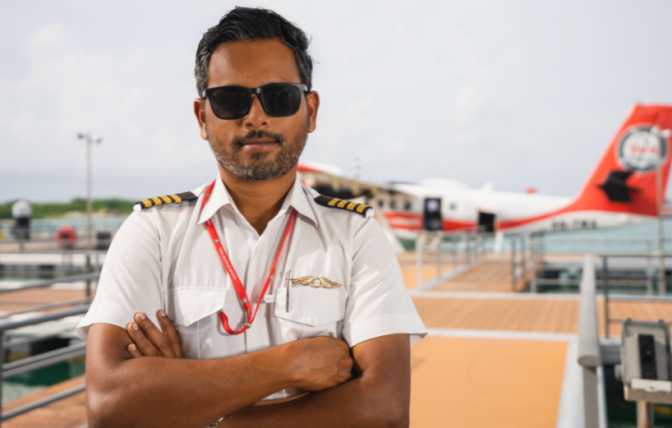

Ahmed Azmee is currently holding a dual role at Trans Maldivian Airways as a Captain, as well as the position of Assistant Manager, Technical Operations.
Apart from the day-to-day duties of a seaplane Captain, Azmee’s role also involves functions within technical operations such as managing technical manuals for the crew, department SOPs, audits and creating charts for new water aerodromes, etc.
Azmee talks to us about juggling both roles at TMA and takes us through both sides of flight operations.
Like most of my colleagues, I had aspired to be a pilot since I was very young. Everything related to the field sparked great interest and I was very motivated to pursue a career in it once I was done with school. However, due to financial difficulties, I had to pick an alternate career and completed my bachelor’s degree in IT. I did not lose hope during this period, and I was always on the lookout for an opportunity to fly. Only a few weeks after I completed my degree, my parents told me of a scholarship program that TMA had just announced. I applied and was given the opportunity to be a pilot as part of TMA’s Zuvana Scholarship Pilot Cadet Program.
In my early days at TMA, I got to work closely with office personnel in Flight Operations. Their daily work intrigued me, and I got to use my background in IT to automate and streamline some of the processes of their work. This is how my involvement in Technical Operations began, from automating periodic tasks to managing water aerodrome charts to finally becoming Assistant Manager, Technical Operations at TMA Flight Operations.
I have been lucky to enjoy multiple career aspects at TMA, both as a pilot and in technical operations. Being able to fly in the Maldives is an experience that never gets old. TMA is the largest seaplane operator and has over 80 destinations that we travel to, which ensures that, as a pilot, no two days are the same.
Technical Operations is involved in all documentation and compliance for all departments within Flight Operations. Managing technical manuals for the crew, department SOPs audits and creating charts for new water aerodromes are some of the many functions within Technical Operations. I have been fortunate to have many amazing mentors along the way, and a growing team helping to manage the workload.

Flying duties and work in Technical Operations both demand different mindsets. My typical workweek would involve a mix of flying and technical duties. So, in a way, I don’t usually have a “typical” day. A full day of technical work would mean I start at 9 am, while a busy day of flying would dictate duty starts at 5:30 am. I might be starting from a layover and getting off for office duty or a meeting, and then get back onto an aircraft for flying later on.
Seeing such a beautiful country from above has to be one of the best things about being a pilot at TMA. Seaplanes fly at a much lower altitude compared to land planes in the Maldives, so we get a closer view of the many pristine sights of this country. From pods of dolphins to white sandy beaches, I never know what the day has to offer.
When I am not enjoying the views, I am in the office. Technical Operations brings a lot of work that needs to be done at a computer, but we also handle multiple projects geared towards improving the efficiency of many aspects of Flight Operations. Being a part of such projects that makes a difference in our operations as a whole is one of the best aspects of this role.
My two roles are very co-dependent. I would not be the pilot I am today without my experience in Technical Operations, nor would I have made the same decisions in Technical Operations if I was not a pilot. This unique perspective is what I would say is the best part of my job at TMA.
We operate seaplanes to over 80 resorts in the Maldives, each affected by weather differently and with different operating areas and platform locations. We have multiple nationalities, cultures and age groups working together to reach a common goal. On busy days in the high season, we sometimes take over 5000 daily passengers to their destinations. I believe that the biggest challenge is to ensure that regardless of all these factors, our operations remain safe, compliant and efficient. It takes a great workforce to achieve this daily, with proper procedures, safety nets and efficient work planning.
Becoming a Captain is my biggest personal achievement as a pilot. On this journey, I also managed to discover a whole new crucial area of aviation that I never knew about and managed to use my previous educational experience as a stepping stone into Technical Operations. TMA, being the world’s largest seaplane operator has a lot to offer budding careers in aviation. I am proud to have used this opportunity to reach where I am now.
It is a great time to be in the piloting profession. However, pilots in different roles, airlines and countries may need different requirements. Do a lot of research before you pick a training school to make sure it meets the requirements that your dream job needs. Becoming a pilot is not without its challenges, but I can tell you first-hand that it’s all worth it in the end. Never stop dreaming.
To my younger self, I would say be confident and have faith in your capacity to grow. It is never too late to learn something new. While working here I got to discover exciting new challenges that I had to overcome learning skills that I had initially shied away from when I was younger.